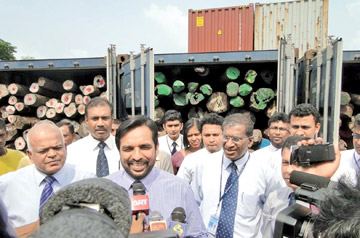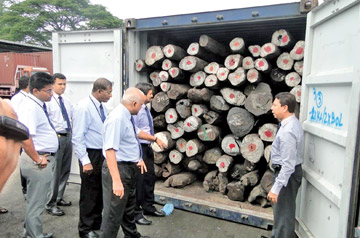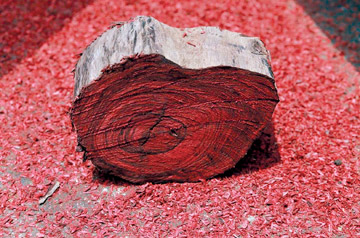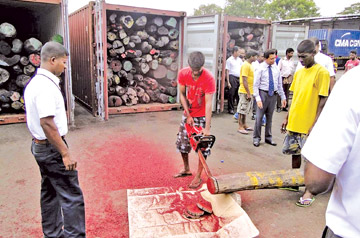|
Largest-ever Rosewood detection :
Customs bust smuggling syndicate
By Kurulu Kariyakarawana
Colombo Port being the most crucial shipping hub of the South East
Asia connecting the East and West plays a major role in transshipment
activities in the world. Thousands of containers carrying cargo is being
loaded and unloaded everyday with vessels bound to various destinations.
 |
| Senior Customs
officials inspecting the consignment |
 |
| Customs
Director General Jagath P Wijeweera explaining about the
detection |
 |
| A chunk of
Rosewood timber |
 |
| A Rosewood log
being chopped for verification |
The location which was used by numerous shipping agencies with
confidence for the legitimate flow of goods for many years has also
seemed to have attracted the attention of global smuggling syndicates.
This was proved by the recent detection of a massive Rosewood shipment
in the harbour.
The Sri Lanka Customs Bio Diversity, Cultural and National Heritage
Protection Division (BCNP) seized 28 containers carrying a large stock
of Rosewood worth over one billion rupees ($7million) that arrived at
the harbour as a transshipment in the last week of March. The containers
had 3, 660 logs weighing over 420 metric tons. The stock was full of
mature Rosewood logs with an approximate girth of eight inches. Customs
Director General Jagath P Wijeweera who examined the contraband at the
Grey Line 2 Yard last week told the media that the transshipment has
arrived in the country from an African country to a far Eastern
destination as a part of a well organised international smuggling
syndicate.
However the detection was not done accidentally as a result of an
unexpected turn of events but following a well planned mission. Customs
BCNP received an information about a smuggling attempt of a stock of
Rosewood about two months ago which they then followed it up until it
arrived in the country. The initial investigations revealed that the
stock was shipped from East African port in Zanzibar and was reportedly
bound for Hong Kong. Deputy Director of Customs BCNP Samantha Gunasekara
said that they received a reliable information that six containers
carrying high quality Rosewood is heading towards Colombo.
With this tip off the unit prepared to seize six containers having
done their initial investigations and tracking the proceeding ship for
two months. The unit became extra vigilant about suspicious maritime
movements especially between the destinations of East African region and
far Eastern Asian countries via the Sri Lankan waters. As scheduled
before the ship arrived at Colombo Port on March 24 and the containers
were unloaded. Among the shipment the Customs found only four containers
carrying Rosewood and not six. The probe was intensified and the entire
shipment was searched following the initial detection. To their utter
amazement 24 more containers were found carrying the same contraband
making it the largest ever detection of Rosewood that an enforcement
agency conducted in the world.
The recovered batch of containers were then transferred to Customs
Grey Line 2 container yard for inspection purposes. There they found the
logs to be the finest quality of Dalbergia Nigra. Rosewood is considered
as one of the most valuable tropical hardwood that is found in
Madagascar, East Africa and Brazil and South East Asian countries.
Rosewood found in Madagascar has more demand than the same of other
origins. The tree has a very long maturity period which is nearly 300
years to grow up to the size of a trunk with a girth of eight inches.
According to Customs Spokesman Director Leslie Gamini felling
Rosewood trees for its timber has become an environmental issue in
Madagascar and nearby East African countries as it is threatening the
ecological balance of these countries. Also the threat of extinction of
this rare tree from their forest. Therefore cutting and trading Rosewood
is banned in Madagascar. Destruction of precious tropical forest cover
of Madagascar has become not only an environment issue but political and
human welfare issue in that country still threatening the political
stability of that highly bio diversity hot spot of the world. Rosewood
has a very high demand in international market for manufacturing high
end furniture, musical instruments ornaments etc. Collecting Rosewood
furniture is an expensive hobby in the west and the timber is used to
manufacture sensitive instruments like guitar boxes and piano parts.
Also expensive Chess figures are made out of this wood.
According to the powers vested in the Customs Ordinance and and
Convention on International Trade in Endangered Species of Wild Fauna
and Flora (CITES) the Director General of Customs is empowered to
enforce the law on any consignment of Import or Export (even
transshipment) of Rosewood. Since Sri Lanka being a signatory to this
international convention it is the Customs Department's responsibility
to act on the instances of smuggling such species mentioned in CITES.
Rosewood happens to be in the appendix II of this Convention in which
international trading is allowed only on permits issued by local
authority concerned. Limited quantity is granted as an annual quota for
source countries in order to restrict the heavy trading so that this
rare tropical tree can be saved from extinction. In view of being
signatory to this convention Sri Lanka Customs has an obligation to act
on any information provided regarding CITES commodities.
Since the contraband came in as a part of a transshipment the Customs
couldn't do much on its Consigner or Consignee. But they are going after
the responsible shipping agency which was in charge of the shipment.
Statements have already been recorded from the local agents of this
international agency who possess the documents saying that the cargo was
timber. Although the consigner's manifest declared the goods as general
cargo (which could be anything)
whereas the shipping agency's manifest declared it as timber. This
had risen a suspicion among the investigators who doubt whether the
shipping of the illicit consignment has been wilfully facilitated by the
shipping agency.
Another fact the officials noticed was that the batches of logs in
containers bore a different coloured marking. This was considered as a
secret code perhaps to classify the variety of qualities of the logs
being marked by the consigner for the requirement of the consignee.
The Customs that are continuing with their investigations at present
is yet to determine what to do with the illicit consignment.
Investigation are being carried out by the staff of Customs Bio
Diversity, Cultural and National Heritage Protection Unit under the
Direction of Superintendent R D A N G. Niyarepola, Deputy Director
Samantha Gunasekara, Director Customs Social Protection M. Paskaran
under the instructions of Customs Director General Jagath P. Wijeweera.
|

